22nd Aug 2022
As Biden Offers Us More and More War, Crime and Economic Insecurity, Trump Offers Up Peace and Prosperity-The 'Deal with Sheol'
The mounting confrontation between US-NATO forces and Russia is portrayed by the Biden administration and the American corporate media as entirely the product of Russia’s invasion of Ukraine. This in turn is attributed to the demonic intentions of one man: Russian President Vladimir Putin.
This rips the Russia-Ukraine war out of its historical context. Most importantly, it conceals the role of the American C.I.A. in preparing and deliberately instigating the conflict. The reactionary war has been seized on to generate a veneer of popular support to the long-prepared US-NATO campaign to overthrow the Putin regime, break up Russia, and reduce it to a semi-colonial status.
The Democratic Party has played the central role in an anti-Russia campaign that goes back more than a decade.
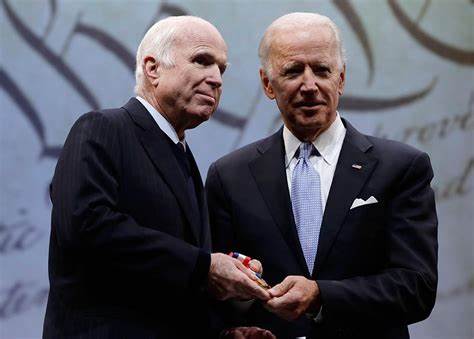
The break-up of the USSR and civil war in Yugoslavia
During the first stages of the collapse and disintegration of the Soviet Union, the two major capitalist parties in the United States were in general agreement on the policy to be pursued in that vast region of the world. The break-up of the USSR was pursued, albeit with some caution, to create the best conditions for American corporations and banks, and to cement US world domination in what was variously described as the “unipolar moment,” and “the end of history.”
George H. W. Bush ordered the massive military mobilization that resulted in the swift destruction of the Iraqi army in the 1991 Persian Gulf War, but he did not press the advantage, rejecting the advice from some aides to invade Iraq and overthrow Saddam Hussein, because he did not want to provoke a response from Moscow that might delay the ongoing collapse of the regime.
Bush did not initially welcome the immediate secession of the various component republics of the USSR. He sought to limit the dispersion of the Soviet nuclear weapons stockpile, which was physically distributed across four republics—Russia, Ukraine, Kazakhstan and Belarus. Ukraine and Kazakhstan possessed the third- and fourth-largest nuclear arsenals in the world, more than China, France or Britain, although Moscow controlled the launch codes. Under the 1992 Lisbon Protocol to the START Treaty, signed in a hotel bar under the auspices of the US Secretary of State James Baker, the other three republics agreed to transfer their nuclear weapons to Russia.
After ratification by their respective governments, separate agreements were signed in 1994 (collectively known as the Budapest Memorandum), in which Belarus, Kazakhstan and Ukraine formally agreed to transfer their nuclear weapons to Russia in return for financial aid and certain security guarantees, directed at both the Western powers and Russia. Great Britain was an additional signatory to the deal, along with the United States. The ensuing transfer process took time and was not completed until 1996.
The first significant divisions over Russia policy—with the Democrats taking the more aggressive posture—emerged in relation to the civil war in Yugoslavia, which had begun in 1991, triggered by the recognition by Germany of breakaway regimes in the constituent republics of the Yugoslav federation, first Slovenia, and then Croatia. These declarations of independence left large portions of the Serb population, the largest ethnic group, suddenly minorities in the new states, which were defined by ethnicity.
The US and NATO intervened in support of the anti-Serb factions, backing the Croatian government in a fascistic war against its Serb minority, as well as on the side of the Muslim-dominated government in Bosnia. This culminated in the saturation bombing of Serbia in 1999 after the CIA-backed uprising in Kosovo, spearheaded by the Kosovo Liberation Army, an Albanian nationalist grouping linked to drug-trafficking and outright gangsterism.
Russia was allied with the Serbian regime of Slobodan Milosevic. The NATO air war against Serbia, which included the bombing of the Chinese embassy in Belgrade, culminated in a confrontation between US and Russian forces at the airport in Pristina, Kosovo, which threatened to become an outright military clash, only averted at the last minute.
The Clinton administration pursued its aggressive policy, particularly in relation to Kosovo, without much Republican Party support, outside of the hawkish faction led by Senator John McCain. Clinton was unable to get a resolution through Congress endorsing US military action, which had to be conducted within the NATO framework instead. He obtained support for a postwar US military deployment as part of a “peacekeeping” force only by a narrow margin.
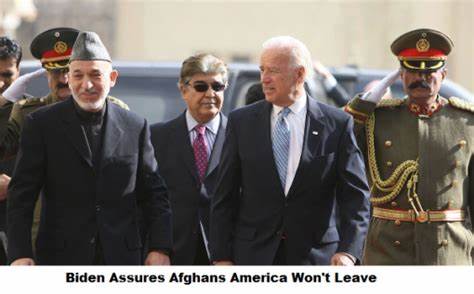
Afghanistan, Iraq and the Orange Revolution
Official US foreign policy toward Russia did not shift significantly until the administration of George W. Bush, the son of George H. W. Bush. Using the September 11, 2001 terrorist attacks as a pretext, Bush ordered the US invasion and occupation of Afghanistan. He then outlined in his first State of the Union Address a doctrine of pre-emptive war (illegal under the precedents set in the post-World War II Nuremberg Tribunals), which justified unilateral US attacks on countries deemed to be “potential” threats.
The first targets, identified by Bush as the “axis of evil,” were Iraq, Iran and North Korea, with later additions including Syria and Libya. All these governments, not incidentally, had close relations, and in some cases direct alliances, with Russia.
A new US National Security Strategy, issued on September 17, 2002, codified this new doctrine, which became the basis for the Authorization for the Use of Military Force passed by Congress in the fall of 2002. Congressional Democrats were split over the AUMF, but key foreign policy leaders, including Joe Biden, the chairman of the Senate Foreign Relations Committee, and House Minority Leader Richard Gephardt, delivered enough Democratic votes to ensure passage of the resolution, which provided the legal framework for the impending US invasion of Iraq.
When the 2004 “Orange Revolution” took place in Ukraine in December 2004—the overturning of the election of pro-Russian presidential candidate Viktor Yanukovych, and the victory of pro-EU and pro-US candidate Viktor Yuschenko in a third round of that year’s elections—the result was hailed by the US political establishment as a triumph of democracy.
But the new regime quickly sank into a mire of corruption and factional infighting between rival groups of capitalist oligarchs, each seeking to profit from the privatization of assets bequeathed by the former Soviet Union. Ukraine had been the second largest constituent republic of the USSR, endowed with rich agricultural resources and significant industrial and public infrastructure, and there was a lot to plunder.
The Bush administration was preoccupied with the debacle in Iraq and the ongoing war of occupation in Afghanistan. It failed to press the advantage represented by the installation of the Yuschenko government. Sections of the Republican Party, including former presidential candidate Bob Dole and former party chairman Paul Manafort (later Donald Trump’s campaign chairman), even became lobbyists and political advisers for Yanukovych or for the billionaires who financed and backed his Party of Regions, based largely in the predominantly Russian-speaking eastern half of the country.
For the next several years, managing the financial crisis, winding down the war in Iraq and intervening in the sudden eruption of the “Arab Spring” revolts in 2011, culminating in the US-NATO bombing of Libya and the civil war in Syria, preoccupied the new Obama-Biden administration. Equally important was the massive escalation of the US war in Afghanistan, to which Obama committed more than 100,000 troops. This huge force required equally huge logistical support, with many supplies shipped to the landlocked country over Russian railways with the consent of the Putin government.
The Obama administration launched the “Northern Route” in January 2009, and for a time it exceeded in volume the much shorter and more direct route through Pakistan. This became particularly important in 2011 and 2012, when Pakistan shut down shipments to Afghanistan for months in response to the killing of Pakistani citizens by US drone missile strikes.
Moscow even permitted the transit of US soldiers and weapons to Afghanistan through Russian airspace. In March 2012, plans were announced for a NATO transit hub at an airbase in Ulyanovsk on the Volga River. On June 25, 2012, the Russian government issued a formal decree authorizing NATO to use the airbase.
In order to maintain this de facto alliance with Moscow, the Obama administration accepted the victory of Yanukovych in the 2010 presidential elections. In the first round, incumbent Viktor Yuschenko was eliminated, receiving a humiliating five percent of the vote, an expression of vast popular disillusionment with the free market policies of the “Orange Revolution.” In the second round, Yanukovych defeated the candidate of the Ukrainian nationalists, Yulia Tymoshenko, by a margin of three percentage points, in an election certified as fair by international observers. The new government quickly withdrew Ukraine’s application to join NATO and signed an agreement with Russia extending its lease on the Sevastopol naval base, headquarters of the Black Sea fleet, for another 25 years.
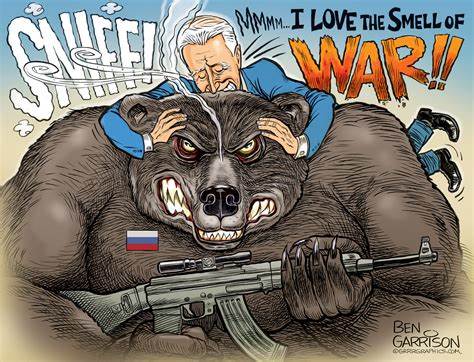
The Maidan “revolution”—a right-wing coup
The occasion for a radical policy shift was provided by Russian intervention into the Syrian civil war. Moscow had long been allied with the Assad regime, which had offered Russia its only military base outside the former Soviet Union, a naval installation at Tartus. Russia supplied Syria with extensive military aid, but no personnel, while the US-backed rebellion intensified, mobilizing Al Qaeda-linked forces, including Islamist militants shipped into the country by the CIA from Libya, where they had served as the ground troops for the overthrow of the Gaddafi regime in 2011.
Obama had declared the use of chemical weapons in Syria a “red line” that would justify US military intervention against Assad, and an incident in August 2013, likely engineered by the CIA, provided the necessary pretext. But Obama had not secured the home front. His factional opponents in the Republican Party, in control of the House of Representatives, blocked a vote for an Authorization for the Use of Military Force, similar to those before the Afghanistan and Iraq wars, and Obama’s threats were left hanging. Putin swooped in, offering a diplomatic escape route, and Obama accepted the Russian offer to take custody of all chemical weapons in Syria and remove them from the country.
In a phone call intercepted in early February by Russia and made public, US State Department official Victoria Nuland could be heard boasting that the Obama administration was spending $1 billion a year on regime-change operations in Ukraine.
On February 22, the right-wing opposition seized power and Yanukovych fled Kiev for exile in Russia, the Western media hailed it as a democratic revolution. In an indication of its real character, the new regime immediately declared Ukrainian the sole national language, although 20 percent of the population speak Russian primarily. The chief rabbi of Kiev urged Jews to leave the city, given the prominence of neo-Nazis in the Maidan uprising.
The response to the coup in Russia was to mobilize military forces, particularly on the borders of eastern Ukraine and the Crimean peninsula, both populated by a majority of Russian speakers. On February 28, pro-Russian militia forces seized control of Crimea, soon joined by Russian troops.
The coup regime in Kiev began to carry out an increasingly right-wing program, implementing drastic austerity measures aimed at the Ukrainian working class, and making threats of massacre when these measures sparked protests in eastern Ukraine, an area with close economic ties to Russia and largely populated by Russian-speaking people.
In the midst of these events, the billionaire oligarch controlling the Ukrainian gas firm Burisma, a former official of the Yanukovych regime, took out an insurance policy by hiring the US vice president’s son, Hunter Biden, for a lucrative position on the company’s board of directors. The money grubbing by the younger Biden was part of a “gold rush” to Kiev, as wheeler-dealers, arms traffickers and political charlatans of all descriptions flocked to Ukraine hoping to profit from the new US-backed regime.
After getting the green light from Washington, the Ukrainian government launched a military onslaught in eastern Ukraine, spearheaded by fascist elements such as the Right Sector and the Azov Brigade.
In July 2014, the Saudi-financed offshoot of Al Qaeda, Islamic State in Iraq and Syria (ISIS), which had become a significant factor in the US-backed civil war against the Assad regime, abruptly changed the direction of its military operations, crossing the border into Iraq, routing the military forces of Baghdad, taking control of the entire western third of Iraq, largely Sunni-populated, and capturing Iraq’s second-largest city, Mosul.
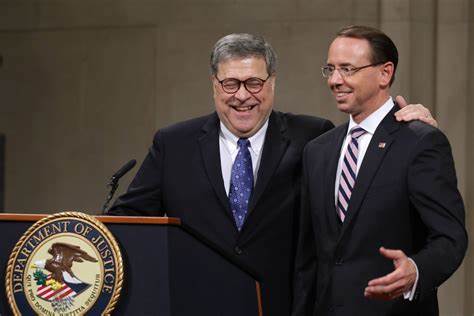
The 2016 election and the Mueller investigation
The “Russian question” was put back on the US agenda in the course of the 2016 presidential election. Democrat Hillary Clinton ran openly as the preferred candidate of the national-security apparatus and a strident advocate of stepped-up intervention in the territories of the former Soviet Union.
A column by Paul Krugman in the Times branded Trump “The Siberian candidate,” (a takeoff on the Cold War thriller, “The Manchurian Candidate”), suggesting he was a Russian agent. Similar columns, with less lurid headlines but equally inflammatory arguments, appeared in The Atlantic magazine, the Los Angeles Times, and elsewhere. Clinton took up this theme and made it central to her general election campaign.
The Democrats were not just using the corporate media to advance the “Trump is a Russian agent” smear. Clinton contacted the military-intelligence apparatus directly, leading to the opening of an FBI probe of Trump and his entourage, which would ultimately be transformed into the Mueller investigation. At the same time, Trump’s campaign chairman Paul Manafort came under fire for his past work as a lobbyist for the pro-Russian ex-president of Ukraine, Yanukovych, and was forced to step down, only three months before the election. He was replaced by Steve Bannon, an out-and-out fascist.
Within weeks of the election, before Trump had even taken office, leaks from the CIA and other agencies generated media reports of supposedly massive Russian interference in the presidential election. There were claims that politically damaging transcripts of Clinton’s closed-door talks to Wall Street audiences, published by WikiLeaks before the election, had been leaked to the anti-censorship group by Moscow, and that Russian military intelligence had hacked the Democratic National Committee to obtain emails proving that the DNC favored Clinton over her principal primary challenger, Senator Bernie Sanders.
Enormous pressure was placed on the White House through the corporate media and leaks from the FBI. In response, Trump fired FBI Director James Comey, setting off a political firestorm in Washington. Trump was compelled to agree to the appointment of a special prosecutor, former FBI Director Robert Mueller, to investigate all aspects of supposed Russian intervention into the 2016 election and any coordination between Russia and the Trump campaign.
The Mueller investigation continued for nearly two years, culminating in a report, delivered in April 2019, which found no evidence that Russian actions in the course of the 2016 election played any significant role in its outcome, or that there was any direct collusion between the Trump campaign and the Russian state. While indicting more than a dozen Russian officials and agents—all of whom were inaccessible to the US courts and unlikely to respond to the charges against them—the Mueller probe indicted only a few minor Trump advisers on charges of lying to investigators, essentially crimes triggered by the probe itself.
Now the central axis was to be preparation for “great power conflict” with Russia and China, defined as “revisionist powers” because they presented challenges to the global domination of the United States.
In August 2019, a leak from a CIA operative working in the White House revealed that Trump had pressured Ukrainian President Volodymyr Zelensky in an official phone call to come up with political dirt on former Vice President Joe Biden. This was in relation to the lucrative position his son Hunter had taken on the board of directors of Burisma, a Ukraine energy company. The appointment of the younger Biden, who had no relevant qualifications or experience, was a transparent effort to curry favor with his father, who had been put in charge of US policy in Ukraine.
As part of his efforts to force the government in Kiev to undertake political dirty work against his most likely opponent in the 2020 election, Trump then withheld arms shipments to Ukraine for several weeks. The exposure of this delay, and the apparent quid-pro-quo of demanding political favors as the price of supplying weapons, was turned into a political sensation by the corporate media.
The ferocity with which the entire US national security apparatus responded to a temporary delay in sending anti-tank missiles and radar to Ukraine raises the question: Is there a timetable for using these weapons in combat against Russia?
Indeed there was, and that timetable now drives US foreign policy following the installation of the Biden administration. But the first Trump impeachment fell short of its goal. He was impeached (indicted) by the House of Representatives in December 2019, but a brief Senate trial ended in his acquittal on February 5, 2020, as only one Republican senator voted to convict.
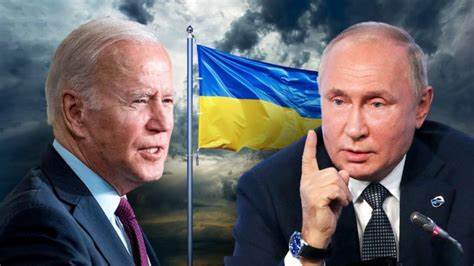
The 2020 election and Biden’s drive to war against Russia
The selection of Joe Biden as the Democratic presidential nominee—the very outcome that was foreshadowed in the first Trump impeachment—represented an intensification of the pro-military focus of the Democratic Party.
This was signaled by Biden’s appointments to high positions at the State Department. For secretary of state, he chose his long-time foreign policy adviser Antony Blinken, who had played a key role in Obama administration policy in Syria in 2013-2014, and in the formulation of the US response to the annexation of Crimea by Russia in 2014, before rising to deputy secretary of state.
Even more significant was Biden’s choice for the third-ranking position at the State Department, deputy secretary for political affairs. Victoria Nuland was notorious as the principal architect of the Maidan coup and a longtime supporter of US military aggression, having served as a top foreign policy adviser to Vice President Dick Cheney during the Iraq war, as US ambassador to NATO, and then as Secretary of State Hillary Clinton’s top spokesperson, in the course of a 37-year career in the State Department. She is also married to Robert Kagan, longtime neo-conservative strategist most closely identified with the Bush administration’s decision to invade and conquer Iraq.
The accession of Biden, Blinken and Nuland was followed by greatly increased aggression on the part of the Ukrainian regime. In February, the Zelensky government shut down three popular television stations run by pro-Russian opposition leader and billionaire Vikto Medvechuk, on the grounds of “national security.” In March, Ukraine’s National Security and Defense Council approved a strategy for retaking Crimea, including restoring “full Ukrainian sovereignty” not just over the peninsula, but over the port city of Sevastopol, home of the Russian Navy’s Black Sea fleet.
Blinken visited Ukraine in May, accompanied by Nuland, for meetings with Zelensky to prepare for an eventual visit by the Ukraine president to Washington—the same invitation he had unsuccessfully sought when Trump was in the White House. The visit came only a week after right-wing elements held a march in Kiev to celebrate the 78th anniversary of the establishment of the 14th Waffen Grenadier Division of the SS, also known as the 1st Galician, comprised of Ukrainian and German volunteers who fought for Hitler against the USSR.
Zelensky, Blinken and Nuland all have Jewish backgrounds (Nuland’s father was born in the Bronx of Ukrainian immigrant parents), but they shamefully said nothing about the neo-Nazi celebration in the capital of Ukraine. Instead, they discussed the ongoing military build-up in which these fascist elements play a key role.
A series of military exercises that summer ensued with NATO and Ukrainian forces operating together. In May came Defender 2021, a major land exercise across all of Eastern Europe involving 28,000 troops from 26 countries. Germany, which invaded the Soviet Union and killed 27 million people during the Second World War, provided the main base of operations.
In June came Operation Sea Breeze, the largest ever naval maneuvers in the Black Sea, begun just days after an incident in which Russian warplanes dropped bombs near a British warship that crossed into Russian territorial waters off Crimea.
In July, Cossack Mace included forces from Ukraine, Great Britain, Denmark, Sweden, Canada and the United States. It involved “defensive actions … followed by an offensive to restore the borders and territorial integrity of the country that has been attacked by a hostile neighboring state.” This was followed by Three Swords 2021, a land exercise involving Ukraine, Poland, Lithuania and the US.
In August, Ukraine convened the inaugural “Crimea Platform” summit in Kiev in an effort to build international support for a military offensive against Russia to “return” the Crimean peninsula to Ukraine. Officials from 44 countries took part, including representatives from all 30 NATO members. Zelensky opened the conference by denouncing Russian “aggression,” and declaring, “I will personally do everything possible to return Crimea so that it becomes part of Europe together with Ukraine.”
The participants of the summit issued a Joint Declaration that stated, “Participants in the International Crimea Platform do not recognize and continue to condemn the temporary occupation and illegal annexation of Crimea, which constitutes a direct challenge to international security with grave implications for the international legal order that protects the territorial integrity, unity and sovereignty of all States.”
Given that Russia regarded Crimea as part of its national territory, and Sevastopol in particular as vital to its security, this declaration was little short of a declaration of war. This was followed by Zelensky’s long-awaited visit to the United States, where he met Biden at the White House, as well as Blinken, Pentagon chief Lloyd Austin, and Secretary of Energy Jennifer Granholm. Biden declared his support for the Crimean Platform, while boosting military aid by another $60 million—more than the derisory $55 million in coronavirus vaccines going to Ukraine.
The Ukrainian population has one of the lowest vaccination rates in the developed world, with only 34.5 percent of the population fully vaccinated, the second-lowest rate in Europe (ahead only of Bulgaria), trailing Mozambique, Guatemala, and occupied Palestine. But the Zelensky government refused offers of the Russian-made Sputnik vaccine against coronavirus.
The key result of the Zelensky trip was a new strategic defense framework agreement signed by Lloyd Austin and Ukrainian Defense Minister Andrei Taran. This laid the basis for the formal signing of the US-Ukrainian Charter on Strategic Partnership, on November 10, 2021, by US Secretary of State Antony Blinken and Ukrainian Foreign Minister Dmytro Kuleba.
There is little that needs to be added to this historical record. The Democratic Party has played the central role in preparing a NATO war against Russia over more than a decade. Joe Biden, as a leading Senate voice on foreign policy, as vice president tasked by Obama with running Ukraine policy, and now as president, is deeply implicated in this long-running operation. Now that this policy has produced the war that has long been its goal, America is pressing ahead toward its ultimate aim—the dismemberment of Russia, and the creation of a series of vassal states, dominated by the United States and the European powers—even at the risk of provoking a nuclear war.
Pelosi recently visited Taiwan trying to provoke an attack by China, America is also trying to provoke North Korea to attack South Korea by running continuous live military drills on their borders. America is also trying to provoke Iran to attack Israel by targeted assassinations.
READ MORE: Malaysia’s Mahathir says US seeking to provoke war in Taiwan (AP News)
Trump is the Honeypot
Conducted in the United States is an old-fashioned honeypot trap. But it’s not a conventional version of the scheme in which an attractive woman makes eyes at a lonely intelligence officer.
In the world of espionage, the “honeypot” is a trap in which someone seduces an unsuspecting diplomat or embassy employee. Then the seducer – a “swallow” (woman) or a “raven” (man) – blackmails the dupe.
The “raven” in this case is Donald Trump. And the dupe is Vladimir Putin. By romancing the Russian president Donald Trump will get much more than mere information. He is acquiring the most influential ally imaginable. When the Obama administration announced its retaliatory moves, Putin declined to escalate. Trump, rather than standing behind his president, praised Putin and promised to “move on.”
Donald Trump fits right into this picture. The honeypot scheme doesn’t involve sexual propositioning but ideological seduction.
But the honeypot that Ameria has used to trap Putin will have much more serious ramifications than a few email accounts hacked or disinformation spread around the Internet.
America has even grander plans, and Donald Trump could play a role in those as well.
Trump aspires to create a new global alliance founded on conservative values, religious principles, and autocratic leanings. Trump is comfortable working with outright racists, xenophobes, and Islamophobes.
Donald Trump will help create a noxious alliance that gives an international platform for all the most deplorable actors, from white supremacists to crusading Islamophobes.
Putin wanted Trump elected.
As the DNC and the Clinton campaign pinned the DNC hack to Russia and Trump cited emails leaked by WikiLeaks, Hillary Clinton began attacking Trump as “Putin’s puppet.” At the third presidential debate, Clinton argued that Putin supported Trump because he “would rather have a puppet as president of the United States.”
Clinton manufactured connections between Trump and Russia. Throughout 2015 and into early 2016, Trump was the Republican frontrunner, and he had praised Putin many times, suggesting he would “get along well” with the Russian president.
The entire Trump-Russia “collusion” narrative was created by Democrats and the Clinton campaign.
A year after the Mueller investigation was completed, Trump was still whining about it on Twitter, calling it the "Greatest Political Crime in the History of the U.S., the Russian Witch-Hunt." Trump tweeted about it over 300 times, as the New Yorker points out, calling it such things as a "scam" and a "hoax." Trump's supporters, meanwhile — Attorney General William Barr and Senator Lindsay Graham in particular — jumped on the absurd hyperbole train by calling it "a grave injustice" that was "unprecedented in American history."
Putin called Trump "colorful," and an "extraordinary individual, talented individual," and applauded him as anti-establishment. Around the same time, Trump, per the Telegraph, said he would trust Russia over "sleezebags" and "lowlifes" in the U.S. intelligence community, and asked Biden to give Putin "my warmest regards."
The desire of Russian propagandists to “help” the United States was also expressed in their concern for Trump’s well-being and safety. Russian military expert Igor Korotchenko, who previously informally endorsed Trump’s candidacy in the 2024 presidential election, claimed to believe that the former president’s life is in grave danger. In reality, he was simply regurgitating a point made by former New York police commissioner Bernard Kerik on Newsmax, one day earlier. Kerik baselessly suggested to host Eric Bolling that he was worried about the potential “assassination” of Trump in the event he runs for president in the next election.
“This campaign of fomenting hatred in certain circles of American society against Donald Trump can later be converted into a campaign of the political assassination of Donald Trump, at the hands of those who will carry out the orders of the influential circles, which aren’t interested in his return to power. This is a bad scenario, we know the practice of political assassinations in the United States of America,” Korotchenko said.
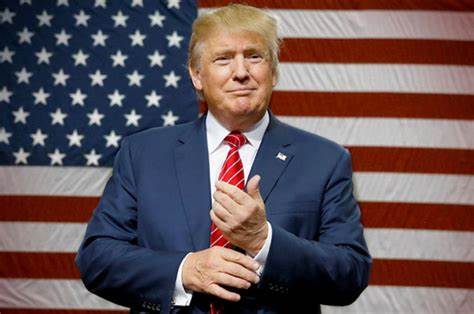
The Phoney Peace Maker
What for so long eluded presidents from Dwight D. Eisenhower to Barack Obama seems to have come effortlessly to President Donald Trump. In the space of just four months, together with Israeli Prime Minister Benjamin Netanyahu, Trump has achieved four peace deals between Israel and Arab states—twice the number achieved by all his predecessors combined. Last Thursday, Trump announced Morocco has joined the United Arab Emirates (UAE), Bahrain and Sudan in the Abraham Accords normalization agreements with Israel. Three or four more Arab states are likely to join the circle of peace in Trump's final weeks in office.
Middle East Peace
Not only has Trump brought more peace to the Middle East, more comprehensively and faster than all of his predecessors combined, but he made it look easy. Israel's ties with its Abraham Accords partners are expanding massively by the day. Tourists from the UAE are streaming into the country. And with one in seven Israeli Jews descended from the Moroccan diaspora, the potential for business and cultural ties between Israel and Morocco is almost limitless.
Critics of the Accords argue that Trump's peacemaking is little more than bribery. In exchange for peace with Israel, the UAE is receiving F-35 fighter jets. Morocco is receiving U.S. recognition of its sovereignty over Western Sahara, as well as advanced drones. Sudan is being removed from the list of state sponsors of terror. Likewise, Trump's earlier recognition of Israel's sovereignty over Jerusalem and the Golan Heights were often ridiculed as "gifts" to Israel that brought no tangible benefit to America.
Afghanistan Peace
President Trump’s former national security advisor, retired Army Lt. Gen. H.R. McMaster, launched a blistering attack on the Trump administration’s Afghanistan peace negotiations Wednesday, accusing the administration of making “a tremendous mistake” by appearing to partner with the Taliban against the Afghan government.
Trump has long argued that U.S. troops should withdraw from Afghanistan, but McMaster said the way the president is going about it is wrong. “What we’re doing is an utter disaster and we and the Afghan people, sadly, may have to pay a much higher price as a result,” McMaster said during a webcast hosted by Arizona State University. “The Afghan people don’t want this.”
Those comments came the same day that Trump’s current national security advisor, Robert O’Brien, said publicly the U.S. would go down to 2,500 troops early next year.
But in February the United States, represented by ambassador Zalmay Khalilzad, the State Department’s special representative for Afghanistan reconciliation, negotiated a separate peace deal with the Taliban that commits Washington to withdraw all its forces from Afghanistan, contingent on the Taliban agreeing to certain conditions.
McMaster excoriated the structure of the peace talks, which he said gave the impression that the United States was abandoning its allies in the Afghan government and siding with the Taliban, whom he described as a “small minority … of odious people” with no regard for human rights.
Coming soon: Ukraine / Putin Peace Deal
Former President Donald Trump on Monday urged Ukrainian and Russian leaders to sign a peace deal soon, or ''everyone will be dead.''
''It doesn't make sense that Russia and Ukraine aren't sitting down and working out some kind of an agreement. If they don't do it soon, there will be nothing left but death, destruction, and carnage,'' Trump said in a statement Monday.
''This is a war that never should have happened, but it did. The solution can never be as good as it would have been before the shooting started, but there is a solution, and it should be figured out now—not later—when everyone will be dead!''
Trump is a CIA covert operation, a honeypot. Trump was accused of being pro-Putin, but nothing could be further from the truth. It's a front. When the Russians finished Nordstream 2 and could supply Europe with oil the powers that be, the U.S. oligarchs lost patience, Biden pushed Russia to invade Ukraine and is now trying to get China to invade Taiwan and start world war three. Trump is the fall back plan to make peace with Putin if NATO loses.
Speaking with New York Magazine, Trump indicated he has already made a decision to launch a 2024 campaign but has not determined when to make his announcement. Trump signaled he is weighing an announcement either before or after the midterm elections in November.
Trump 2024
The Antichrist will sign a treaty with the state of Israel for a period of seven years.
God refers to this agreement as a "covenant with Sheol" (or hell), and God's assessment will prove true when the Antichrist breaks this covenant after three and a half years.
This is also the time when the two witnesses prophesy.
"The ruler will make a treaty with the people for a period of one set of seven, but after half this time, he will put an end to the sacrifices and offerings. And as a climax to all his terrible deeds, he will set up a sacrilegious object that causes desecration, until the fate decreed for this defiler is finally poured out on him." Daniel 9:27 (NLT)
“And after threescore and two weeks shall Messiah be cut off, but not for himself: and the people of the prince that shall come shall destroy the city and the sanctuary; and the end thereof shall be with a flood, and unto the end of the war desolations are determined. And he shall confirm the covenant with many for one week: and in the midst of the week he shall cause the sacrifice and the oblation to cease, and for the overspreading of abominations he shall make it desolate, even until the consummation, and that determined shall be poured upon the desolate.” Dan. 9:26, 27
“When ye therefore shall see the abomination of desolation, spoken of by Daniel the prophet, stand in the holy place, (whoso readeth, let him understand:) Then let them which be in Judaea flee into the mountains: … For then shall be great tribulation, such as was not since the beginning of the world to this time, no, nor ever shall be.” Matt. 24:15 – 21.
Therefore hear the word of the LORD, O scoffers who rule this people in Jerusalem. For you said, “We have made a covenant with death; we have fashioned an agreement with Sheol. When the overwhelming scourge passes through it will not touch us, because we have made lies our refuge and falsehood our hiding place.” So this is what the Lord GOD says: “See, I lay a stone in Zion, a tested stone, a precious cornerstone, a sure foundation; the one who believes will never be shaken.…
...will make justice the measuring line and righteousness the level. Hail will sweep away your refuge of lies, and water will flood your hiding place. Your covenant with death will be dissolved, and your agreement with Sheol will not stand. When the overwhelming scourge passes through, you will be trampled by it. As often as it passes through, it will carry you away; it will sweep through morning after morning, by day and by night.” The understanding of this message will bring sheer terror.…
Do yourself a favor. Think for yourself. Be your own person. Question everything. Stand for principle. Champion individual liberty and self-ownership where you can. Develop a strong moral code. Be kind to others. Do no harm, unless that harm is warranted. Pretty obvious stuff...but people who hold these things in their hearts seem to be disappearing from the earth at an accelerated rate. Stay safe, my friends. Thanks for being here.
READ MORE:
- Julian Assange: The Most Dangerous Man in the World
- Boycott America Free Assange
- No More Blood for Oil Stop World War
- I Am The Most Dangerous Man in the World
- Julian Assange Gave Us Evidence the U.S. Commits War Crimes
- NSA whistleblower: The C.I.A. and Saudi Arabia's Brutal State Police
- Who Flew on Jeffrey Epstein's 'Lolita Express' Plane? Full List of People Named
- UNSEALED: Jeffrey Epstein's CLIENT LIST: Full List of People Named
- I Know Who Killed Jeffrey Epstein
- Child Sex Abuse Prevention
- What to do during a Sexual Assault
- Both of America's Political Parties Are Too Corrupt to Support
Thank you for stopping by. PLEASE scroll down to post to social media.
